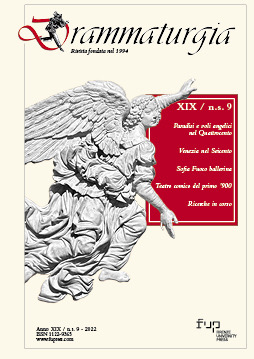Published 2022-12-15
Keywords
- Theatre,
- Renaissance,
- Florence
How to Cite
Abstract
The advancement of studies on Florentine theater in the early decades of the 16th century has underlined the importance of deepening the investigation on the social subjects of the commissioners and on the productive dynamics of the context, especially in relation to a particular group of dramaturgical texts that are formally independent of the supervening comedy modeled on the Latin specimens and tested in Padan and Roman courts. These are texts defined as moral comedies for the thesis that is to be demonstrated, and for the allegorical figures that intervene in them. Texts that would seem to fade behind a monotonous sentence but on the contrary reveal precise intentions and communicative purposes only that they are traced back, where possible, to the client groups and recipients. Such is the case of Jacopo del Polta’s Dell’Inganno who composed his moral comedy at the request of the Compagnia della Cicilia, that is a brotherhood that owned an oratory dedicated to the prayer and worship of Santa Cecilia, near the Franciscan Convent of Fiesole. At some moment the pious brotherhood and the neighboring Franciscan fathers had quarreled over the ownership of a wall. Del Polta’s operetta, recited to entertain the confreres during the banquet, aimed to persuade them to overcome conflicts.


